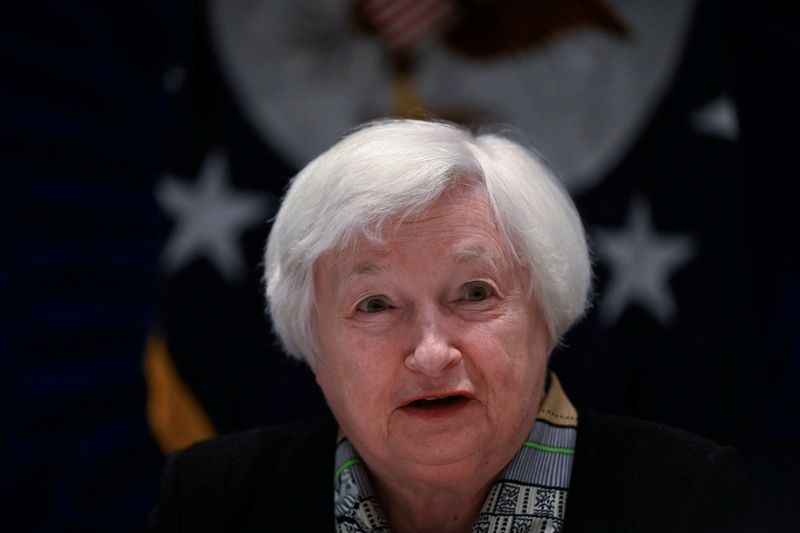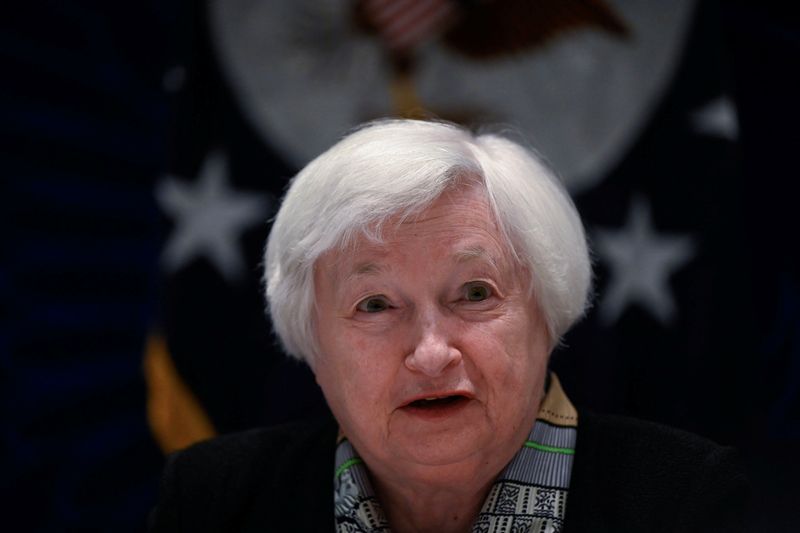Stock Markets
Yellen urges US-China cooperation on economy, climate


© Reuters. US Treasury Secretary Janet Yellen attends a climate roundtable at the US embassy in Beijing on July 8, 2023. Pedro Pardo/Pool via REUTERS
By Andrea Shalal
BEIJING (Reuters) – U.S. Treasury Secretary Janet Yellen on Saturday urged closer communication between China and the United States to improve economic decision-making, and challenged China to join global initiatives to help poorer nations address climate change.
Despite bilateral tensions, record high U.S.-Chinese trade last year showed there was “ample room” to engage in trade and investment, and it was critical to focus on areas of common interest and address disagreements through dialogue, Yellen told Chinese Vice Premier He Lifeng at the start of a meeting.
The talks lasted for about five hours, followed by a formal dinner, according to a Treasury official.
Chinese state media described the meeting as “in-depth, candid and pragmatic”. Treasury said the meeting was “candid, constructive, and comprehensive.”
Yellen is due to hold a news conference in Beijing early on Sunday.
State-run Xinhua news agency said the talks were “constructive”, but the Chinese side expressed concern about U.S. sanctions and restrictive measures against China.
China also believes that generalising the concept of national security does no good for normal economic and trade exchanges, Xinhua reported.
Treasury said Yellen also conveyed that “even when the United States and China have disagreements, it is vital that the two countries find ways to work together on issues of shared – and global – concern, including debt distress in low-income and emerging economies and climate finance.”
Yellen also met with the People’s Bank of China’s Communist Party chief Pan Gongsheng on Friday, discussing global macroeconomic and financial developments, including the disproportionate impact of recent economic shocks on low-income countries, Treasury said.
Yellen’s visit through Sunday is Washington’s latest attempt to repair ties between the world’s two biggest economies, battered over issues from Taiwan to technology that have drawn their allies into their rivalry, having an impact on companies and trade ties.
Like U.S. Secretary of State Antony Blinken, who visited last month for the first time in Joe Biden’s presidency, Yellen is seeking a delicate balance between conciliation and continuing to push Beijing to halt practices Washington says are harmful to U.S. and Western companies.
Both sides have downplayed expectations for breakthroughs, while hailing the opportunity for candid, face-to-face diplomacy.
“Amid a complicated global economic outlook, there is a pressing need for the two largest economies to closely communicate and exchange views on our responses to various challenges,” Yellen told He, China’s recently appointed economy czar.
Doing so could “help both sides more fully understand the global economic outlook and make better decisions to strengthen our economies”, she said.
At the same time, Yellen reiterated Washington wanted to ensure healthy competition with a “fair set of rules” that would benefit both countries over time.
Meeting her at the Diaoyutai state guest house where foreign dignitaries are often received, He said he stood ready to work with Yellen.
Yellen told a group of female economists on Saturday that she was “in Beijing at this critical time because, for all the disagreements between our nations, President Biden and I believe it is in the best interests of our peoples to put our relationship on a better track and to maintain open and honest lines of communication”.
“I strongly believe that the relationship between our two countries is rooted in the solid ties between the American and Chinese people. It is important that we keep nurturing and deepening these ties, especially as China reopens after three years of COVID lockdowns.”
‘MEET CHINA HALFWAY’
As the U.S. seeks to re-engage at all levels, Beijing has repeatedly told Washington to match words with action, pointing to continued U.S. moves to curb Chinese access to technologies including semiconductors.
Beijing has also refused to resume bilateral military ties, while tariffs imposed on Chinese products during a trade war under Biden’s predecessor, Donald Trump, remain intact.
China this week abruptly announced export controls on two metals widely used in semiconductors and electric vehicles in the name of protecting its national security and interests.
Still, recently appointed Premier Li Qiang left the door open to further dialogue, urging Yellen on Friday to “meet China halfway” as both sides inject “positive energy” into bilateral ties.
Despite talk of U.S.-China economic decoupling, which both countries oppose, data show a fundamentally solid trade relationship, with two-way trade hitting $690 billion last year.
The United States would continue to communicate directly its concerns about specific economic practices, and would take targeted actions to protect its national security, Yellen said.
She urged China not to allow any disagreements to “lead to misunderstandings, particularly those stemming from a lack of communication, which can unnecessarily worsen our bilateral economic and financial relationship.”
Yellen told government officials and climate experts on Saturday that China had the capacity to help the world tackle the “existential threat” of climate change.
Beijing and Washington must take the lead in helping poor nations meet their climate goals and cope with the impact of climate change, she told a roundtable.
Cooperation on climate finance was a “critical” responsibility of “the world’s two largest emitters of greenhouse gases and the largest investors in renewable energy”, she said.
China, classified as a developing country by the United Nations, has long said it was the responsibility of developed nations to help poor countries pay to address climate change.
But Beijing says it could contribute to “loss and damage” due to climate change on a voluntary basis.
Stock Markets
Suburban Propane director Logan sells $139k in shares
Stock Markets
Stock market today: S&P 500 closes lower, but posts big weekly win
Stock Markets
TD Bank promotes Laura Nitti to retail market president role

 Forex3 years ago
Forex3 years agoForex Today: the dollar is gaining strength amid gloomy sentiment at the start of the Fed’s week

 Forex3 years ago
Forex3 years agoUnbiased review of Pocket Option broker

 Forex3 years ago
Forex3 years agoDollar to pound sterling exchange rate today: Pound plummeted to its lowest since 1985

 Forex3 years ago
Forex3 years agoHow is the Australian dollar doing today?

 Cryptocurrency3 years ago
Cryptocurrency3 years agoWhat happened in the crypto market – current events today

 World3 years ago
World3 years agoWhy are modern video games an art form?

 Commodities3 years ago
Commodities3 years agoCopper continues to fall in price on expectations of lower demand in China

 Economy3 years ago
Economy3 years agoCrude oil tankers double in price due to EU anti-Russian sanctions





















